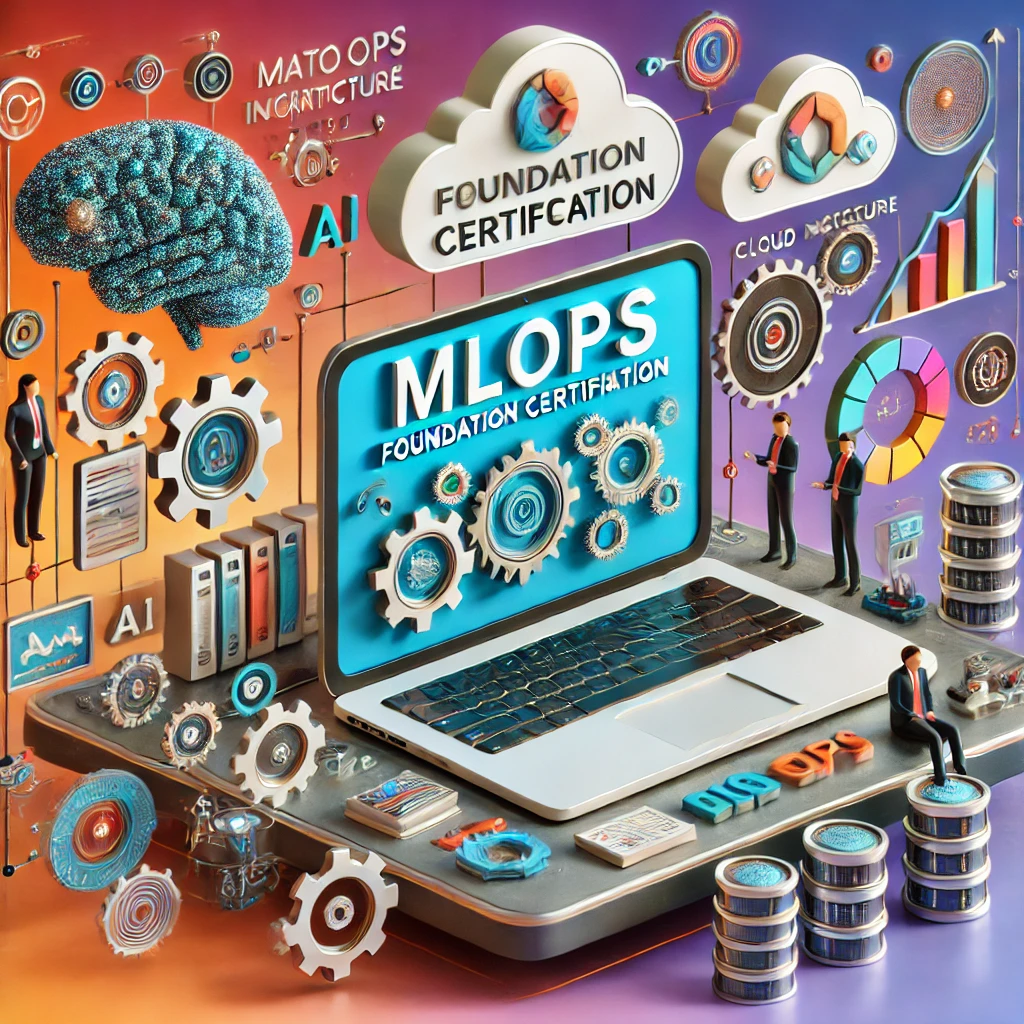
Upgrade & Secure Your Future with DevOps, SRE, DevSecOps, MLOps!
We spend hours scrolling social media and waste money on things we forget, but won’t spend 30 minutes a day earning certifications that can change our lives.
Master in DevOps, SRE, DevSecOps & MLOps by DevOps School!
Learn from Guru Rajesh Kumar and double your salary in just one year.

The MLOps Foundation Certification introduced by DevOpsSchool in collaboration with expert trainer Rajesh Kumar from www.RajeshKumar.xyz is designed to equip learners with a solid understanding of MLOps (Machine Learning Operations) principles and practices. This certification helps students and professionals integrate machine learning models into production systems using DevOps methodologies, focusing on automation, scaling, and monitoring.
Introduction to MLOps Foundation Certification
The MLOps Foundation Certification is designed to provide individuals with a comprehensive understanding of MLOps (Machine Learning Operations), an emerging field that combines Machine Learning (ML) with DevOps practices to automate and streamline the lifecycle of ML models. MLOps focuses on deploying, monitoring, and maintaining machine learning models in production environments. This certification enables professionals to apply DevOps principles to the development and operationalization of ML systems, ensuring scalability, reliability, and consistent performance.
Offered by DevOpsSchool in association with industry expert Rajesh Kumar, the certification is ideal for those looking to enhance their careers by integrating machine learning with DevOps automation, addressing the unique challenges of ML model management.
Who Should Enroll?
This certification is suited for:
- Data Scientists: Looking to deploy and maintain machine learning models in production environments.
- ML Engineers: Focused on operationalizing machine learning models with automation and monitoring.
- DevOps Engineers: Interested in learning how to incorporate machine learning workflows into DevOps pipelines.
- Software Engineers: Looking to understand the integration of ML into broader IT systems.
- IT Managers and Decision Makers: Wanting to learn the benefits of MLOps for scaling machine learning solutions across an organization.
Certification Objectives
The MLOps Foundation Certification aims to:
- Introduce students to the fundamental concepts of MLOps, including its role in automating the ML lifecycle.
- Demonstrate how to deploy machine learning models in production environments efficiently and reliably.
- Teach how to establish CI/CD pipelines for ML models and integrate ML into existing DevOps practices.
- Provide insights into model versioning, governance, and how to handle model drift in production.
- Familiarize learners with tools and technologies for monitoring and maintaining ML models to ensure continuous performance.
- Highlight the importance of collaboration between data scientists, DevOps teams, and ML engineers for successful MLOps adoption.
Comprehensive Agenda of the Certification
This section outlines the curriculum of the MLOps Foundation Certification, covering key areas for learning and practical application.
Module 1: Introduction to MLOps
- Overview of MLOps: What is it and Why it Matters
- Key Challenges in Machine Learning Operations
- Understanding the Differences Between DevOps and MLOps
- Benefits of Implementing MLOps for Enterprises
Module 2: MLOps Framework and Concepts
- The Machine Learning Lifecycle: Data Collection, Model Development, Model Deployment, Monitoring
- Collaboration Between Data Scientists, Engineers, and Operations Teams
- Best Practices in MLOps: Ensuring Scalability, Consistency, and Efficiency
Module 3: Automating the ML Pipeline with MLOps
- CI/CD Pipelines for Machine Learning: Automating Model Training and Deployment
- Automating Data Preprocessing and Feature Engineering
- Tools for Automating Model Deployment: Kubeflow, MLflow, Seldon, TFX
- Continuous Monitoring and Feedback Loops in MLOps
Module 4: Model Versioning and Governance
- Managing Model Versions: Best Practices for Model Version Control
- Ensuring Governance and Compliance for ML Models in Production
- Handling Model Drift: Techniques for Detecting and Responding to Drift in Performance
- Managing Models in Different Environments (Staging, Testing, Production)
Module 5: Monitoring and Observability in MLOps
- Importance of Monitoring ML Models Post-Deployment
- Tools for Monitoring: Prometheus, Grafana, and Custom Monitoring Solutions
- Performance Metrics: Measuring Model Accuracy, Latency, and Resource Utilization
- Automating Alerting Systems for Model Failures or Degradations
Module 6: Tools and Technologies in MLOps
- Overview of MLOps Tools and Platforms
- Kubernetes and Container Orchestration for ML Workflows
- MLflow for Managing the Machine Learning Lifecycle
- Kubeflow for ML Pipelines on Kubernetes
- Data Version Control (DVC) and Tools for Managing ML Data Pipelines
Module 7: Security and Compliance in MLOps
- Implementing Security for ML Pipelines and Data
- Compliance Requirements for Machine Learning in Production
- Role of DevSecOps in Ensuring Secure MLOps Pipelines
Module 8: Scaling MLOps Across an Organization
- Scaling MLOps to Handle Multiple Models and Datasets
- Best Practices for Building Collaborative MLOps Teams
- Cross-Functional Collaboration: Integrating Data Science with IT and DevOps Teams
- Case Studies: Successful Implementation of MLOps in Large Organizations
Module 9: Case Studies and Real-World Applications
- Case Studies on MLOps Adoption
- Lessons from Companies That Have Successfully Integrated MLOps
- Challenges and Solutions in Operationalizing Machine Learning at Scale
Module 10: Exam Preparation
- Sample Questions and Mock Exams
- Key Topics to Focus on for the Certification Exam
- Tips for Passing the MLOps Foundation Certification Exam
Exam Details
The MLOps Foundation Certification exam evaluates your understanding of key MLOps concepts and the application of DevOps practices to machine learning. Here are the exam details:
- Format: Multiple-choice questions
- Duration: 60 minutes
- Number of Questions: 40-60 questions
- Passing Score: 65-75%, depending on the certifying body
- Mode: Online or Proctored Exam
- Prerequisites: None, but prior experience in machine learning or DevOps is beneficial
Learning Outcomes
After completing the MLOps Foundation Certification, learners will be able to:
- Understand the key principles of MLOps and its role in modern data science and machine learning operations.
- Build, deploy, and maintain machine learning models using CI/CD pipelines and automation tools.
- Implement model versioning and governance practices to ensure models in production remain reliable and compliant.
- Monitor and maintain the performance of ML models in real-time environments using industry-standard tools.
- Collaborate effectively with data scientists, DevOps engineers, and IT teams to operationalize machine learning workflows.
- Apply best practices for scaling MLOps to handle large-scale machine learning projects.
Benefits of the MLOps Foundation Certification
- Career Advancement: As organizations increasingly adopt machine learning, professionals with MLOps expertise are in high demand.
- Hands-On Learning: Learn how to apply DevOps principles to machine learning workflows, from deployment to monitoring and scaling.
- Increased Efficiency: Understand how to automate the ML pipeline, reducing manual interventions and improving the reliability of model deployments.
- Collaboration: Gain insights into how to foster cross-team collaboration between data scientists and DevOps professionals, ensuring successful ML model deployments.
- Future-Proof Skills: Equip yourself with skills that are essential in the evolving landscape of AI and machine learning operations.
Why Choose DevOpsSchool for Certification?
- Expert Guidance: With training led by industry expert Rajesh Kumar, the course ensures that students receive practical, hands-on knowledge and real-world insights into MLOps.
- Comprehensive Resources: DevOpsSchool provides access to a range of learning resources, including video tutorials, practice tests, hands-on labs, and real-world case studies.
- Flexible Learning Options: The course offers online learning with flexible schedules, making it accessible for working professionals and students.
How to Enroll
To enroll in the MLOps Foundation Certification, visit DevOpsSchool at www.RajeshKumar.xyz and sign up for the course. The certification program offers online training, making it convenient for learners around the world.